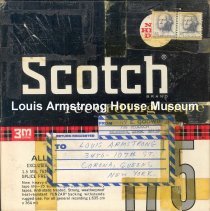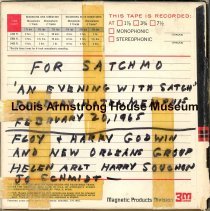Archive Record
Images


Metadata
Catalog Number |
1987.3.0667 |
Title |
[Reel-to-reel tape given to Louis Armstrong] |
Object Type |
Tape |
Collection |
Louis Armstrong Collection |
Description |
Scope: "An Evening With Satch" at the Peabody Hotel. Louis and members of the New Orleans Jazz Club talk about New Orleans musicians and other subjects in Louis's hotel room in 1965. Contents (as on compact disc reference copy): Track 1: Harry Godwin introduces tape, "An Evening with Satchmo at the Peabody Hotel," recorded in Memphis, Tennessee, February 20, 1965 and featuring Louis in conversation with members of the New Orleans Jazz Club and New Orleans Jazz Museum Helen Arlt, Harry Souchon, Jo Schmidt, Floy Godwin and Harry Godwin; Track 2: Louis talks about where he's touring; mentions possibility of playing in Russia; Track 3: Louis talks about wanting to play in New Orleans; mentions sister Beatrice "Mama Lucy" Collins; woman shows pictures from New Orleans Jazz Museum and asks Louis to identify musicians; Louis and the club members mention (and occasionally have short stories about), King Oliver, Minor "Ram" Hall, Honore Dutrey, Lil Hardin Armstrong, David Jones, Johnny Dodds, Jimmy Palao, Alcide "Slow Drag" Pavageau, George Lewis, Eureka Brass Band, Matthew "Fats" Houston; talks about Louis's horn being in an exhibit at the Smithsonian; Matthew "Fats" Houston; Paul Barbarin; Robert "Son Fewclothes" Lewis; Louis "Big Eye" Nelson, Sonny "Chicken" Henry (Louis played in Tuxedo Brass Band with him); Track 4: continue to look at pictures; John Casimir; Red Pearson (Louis thinks it's Red Allen); Joe Robichaux; Alvin Alcorn; Paul Barbarin; Papa John Joseph (talk about his death at Preservation Hall); Lester Santiago; Vernell Santiago; Big Jim Robinson; Casimir's death; Robinson playing with Bunk Johnson and George Lewis; man reads a list of names who told him to say hello to Louis (Dwight and Marjorie Meyers, Joe Glaser, Paul Barbarin, Dr. Edmond Souchon, Sweet Emma, Barrett, Willie Humphrey, Percy Humphrey, Bill Basin, Alton Purnell,); Louis talks about playing Disneyland recently with Sweet Emma Barrett; Track 5: they continue to press him about going back to New Orleans; Louis says he doesn't press Joe Glaser on those matters; talks about where they just played (Iceland, Virgin Islands, Miami, Georgia, Birmingham, Alabama); discussion of the song, "Someday, You'll Be Sorry"; Sharkey Bonano always plays it for them; Louis mentions Bobby Hackett and Peanuts Hucko still playing it; Godwin mentions "Four O'Clock Blues"; they continue with pictures; George Lewis; Billie and DeDe Pierce; Albert Jiles; Bill Matthews; Sweet Emma's popularity; woman shows Louis programs for their jazz concert series; Track 6: asks Louis about supposed trip to New Orleans the year before; false rumor; Louis praises them for keeping jazz alive; they do it as a pastime; talk about the jazz museum; photo of Peter Davis in 1962; Captain Joseph Jones; talk about sending Joe Glaser pictures of Louis from the Colored Waif's Home; offer to send photos of him with Waif's Home band; talk about the Louis Armstrong's Secret 9 team that played when he returned in 1931; Track 7: woman asks Louis if Lucille is with him; Louis talks about red beans and rice; asked about facts surrounding his birth; "firecracker baby" born on the Fourth of July; Emmanuel Sayles, playing with Sweet Emma; George Lewis's successful trip to Japan; Kenny Ball ("a fine boy"); talks about knowing all the English musicians; mentions Humphrey Lyttelton, Chris Barber; Track 8: woman tells Louis about efforts to preserve his first home in Jane Alley; they were told they could move the house to another lot but they bulldozed it without telling them; "The main thing that makes me feel good is you tried," Louis tells them; talk about new home for museum and having a whole Armstrong section; "You can't do the impossible, but I appreciate the efforts that you did"; they ask for specific details about birthplace; Louis talks about the block; didn't know the number of his house; lived there until he was 9 or 10 years old; Louis talks about how much he'd like to come down there; talks about a concert with the Dukes of Dixieland and Al Hirt; Louis sent a telegram to a testimonial for Jack Teagarden; Track 9: woman asks Louis how to get young black listeners into jazz; he talks about how you can't force them; talks about hearing young musicians playing beautifiully music; Louis talks about jazz and rock and roll and its origins in the old sanctified churches; "old soup warmed over"; "jiujitzu music"; being asked about "progressive jazz"; Track 10: woman asks Louis about "new" jazz and how he feels about it; Louis says all you have to do is listen to the music; Louis listens to everything; they talk about jazz in Europe and behind the Iron Curtain; cultural exchange; Louis mentions Nikita Khrushchev ("nice guy"); talk about Louis's latest Christmas card; [tape runs out momentarily]; Track 11: conversation continues from side one; Louis mentions New Orleans Rhythm Kings (George Brunies, Leon Roppolo, Paul Mares, Ben Pollack, Mel Stitzel) and how they belong in the Museum; "they did a lot for jazz"; Louis's interview with Ralph J. Gleason for "Jazz Casual"; they said it was the best thing he's ever done; Louis asks them to write Gleason to get a copy; they show Louis some mementos from the Jazz Museum; they ask Louis to send some of his personal artifacts to them; "Well, I don't know what I have to give you," he responds, "I'd have to go home to do that"; Louis thinks that what he has to send wouldn't be "good enough"; ask him to write the music and words to "Someday You'll Be Sorry" and sign it; Louis says that Billy Kyle is the arranger in his band; Louis says when he goes to New Orleans, he wants to ball; one time he went and was enthused to be onstage with "homeboy" Louis Prima once and the public went crazy; Track 12: Louis offers to buy his guests some drinks; says he has Scotch and Seagram's V.O. in his room; gets Doc Pugh to go for drinks; mentions Antoine's; talks about the Absinthe House, where Fats Pinchon plays; people he used to know; Swiss Kriss; Harry Godwin gives Louis a tape he made for him (can be heard at 1987.3.668); Godwin said he wrote Joe Glaser; Track 13: Louis talks about his tape index; Lucille making him a den in Corona, Queens; would have slept in a room like that growing up in New Orleans; the Beatles; "listen to all kinds of music"; playing in a symphony orchestra with Erskine Tate in Chicago; "Stomp Off, Let's Go"; playing for silent movies; sings "Rigoletto" and says it came from opera; mentions "Sextet from Lucia" as being "your best riffs"; playing for Pathe newsreels; Track 14: being asked about "Louis and the Good Book"; singing in church; spiritual music; no matter what you play, you can make it into jazz; everyone toasts Louis; Track 15: Louis sings an a capella chorus of "Someday You'll Be Sorry"; Track 16: Louis talks about his philosophy of life; everyone too worried about dying; people with a lot of money; Louis delivers a personal message to Myra Menville; Louis mentions it's "scarf time"; talks about a place on Claiborne Street where he gets oysters and gumbo in New Orleans; talk about Sweet Emma not wanting to fly; staying at the Disneyland hotel; Pete Fountain's fear of flying; Duke Ellington only just starting to fly; they show him a Polaroid of a photo they just took; Track 17: They offer to send him a copy of the write-up of this interview; Louis says he collects these things as "food for thought" in case he plans on writing more when he gets older; Louis gives his Corona address; says it's in "the Queens" but "it should be in Long Island"; says all of his mail wait for him; they talk about Sol Yaged and Mary Lou Williams; Louis talks about tape of 1952 concert in New Orleans when Louis told his "hamburger" joke onstage for Myra Menville; they ask Louis what he's going to play at the concert and he responds "Good music," before promising to do "Someday"; Track 18: woman talks about Louis's Suzy Cute commercial and how cute it was; Louis praises the little kids in the commercial; Louis calls for Doc Pugh, saying, "He looks out for ol' Satch"; talk about Memphis and "Old Jim Canan's"; Track 19: Louis says the first time he was on Beale Street was when he was Fate Marable in 1919; names some of the musicians in Marable's band; drinking corn whiskey; Steamer Sidney in New Orleans; ribs and greasy food; celebrating his upcoming 65th birthday with Lucille; sends a message to all the musicians in New Orleans about how much he loves them; "my heart's there"; doesn't care where he lives, that's his hometown and he'll always be a "New Orleans boy"; Louis says it's "scarf time" and they say goodbye and close the tape. |
People |
Allen, Henry Arlt, Helen Armstrong, Beatrice "Mama Lucy" Armstrong, Lil Hardin Ball, Kenny Barbarin, Paul Barber, Chris Barrett, Sweet Emma Bonano, Sharkey Brunis, George Casimir, John Davis, Peter Dodds, Johnny Dutrey, Honore Fountain, Pete Glaser, Joe Gleason, Ralph J. Godwin, Floy Godwin, Harry Hall, Minor Henry, Sunny Hirt, Al Houston, Matthew "Fats" Humphrey, Percy Humphrey, Willie Johnson, Bunk Jones, David Jones, Joseph Lewis, George Lewis, Robert "Son Fewclothes" Marable, Fate Mares, Paul Matthews, Bill Menville, Myra Meyers, Dwight Meyers, Marjorie Nelson, Louis Oliver, King Palao, James Pavageau, Alcide Pichon, Walter Pierce, Billie Pierce, De De Pollack, Ben Prima, Louis Pugh, Hazes "Doc" Purnell, Alton Robichaux, Joe Robichaux, John Robinson, Jim Santiago, Burnell Santiago, Lester Schmidt, Jo Souchon, Edmond Souchon, Harry Stitzel, Mel Tate, Erskine Teagarden, Jack Yaged, Sol |
Search Terms |
Beatles Chicago Colored Waif's Home Corona Louis and the Good Book (album) New Orleans Opera Queens Soviet Union Suzy Cute (doll) Swiss Kriss Tape recordings, Audio |
Date |
February 20, 1965 |
Year Range from |
1965 |
Year Range to |
1965 |
Creator |
Louis Armstrong |
Caption |
1987.3.667 Front |
Accession number |
1987.3 |
